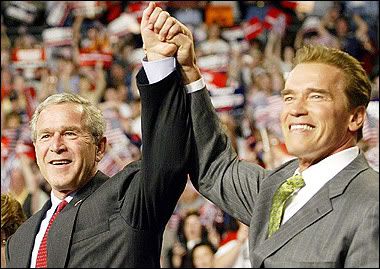(An excellent review of the positions of both candidates. Also, check out jryan86’s blog, Berkeley Bubble, it’s quite good and has some excellent original analysis. – promoted by SFBrianCL)
(Originally posted at Berkeley Bubble).
On a recent drive across the Richmond bridge, while trying to focus on the immense natural beauty of the San Francisco Bay, I couldn’t help but stare at San Quentin prison, which sits at the northern end of the span. As I drove past this prison, I realized that I didn’t want to live in a state where state prisons continue to explode, expand, and become permanent, visible fixtures, of our cities and counties, and of the California landscape.
Sadly, prisons have dominated our political landscape, and prison overcrowding has become a permanent problem. On June 27, Arnold called for a special session to address the prison crisis in California, to deal with overcrowding of prisons. As it turns out now, the Legislature will now consider prison reform beginning on August 7, 2006. And wouldn’t you know it, Arnold just happens to be running for re-election.
Unfortunately, the Terminator’s solution to prison overcrowding is to adopt the same, short-sighted policies that our state has adopted to alleviate traffic on our highways and roads –just build more (lanes) prisons. And Democrat Phil Angelides’ policy proposals for prison reform aren’t much better, as one might expect, as he attempts to cautiously court (or avoid alienating) moderate and independent voters concerned with crime. This is the problem with resolving crises in the middle of election cycles–political expedience takes precedence over viability and policy prudence.
Read the flip for more about the the details on the various policy proposals for prison reform.
Angelides v. Arnold on Prisons
As this report from the Chronicle notes, Arnold called the special session in response to a special report by John Hagar, a special master appointed by federal district court judge Thelton Henderson to deal with use of force, discipline, and other pervasive problems among California’s 33 state prisons. In his report to the Legislature, Hagar highlighted serious problems with the administration of prisons and vast abuses on the part of prison guards, while noting that the state’s prison guard union has been an intractable obstacle to true reform.
Arnold highlighted some of the issues facing the prison system:
“He noted that a system designed to hold about 100,000 inmates houses more than 171,000, and more than 16,000 inmates are sleeping in gyms, dayrooms and other areas of lockups not intended for housing.
Arnold also noted in his speech calling for the special session that in addition to alleviating prison overcrowding, he seeks to address the extraordinarily high recidivism rate here in the Golden State–apparently, it’s the highest in the nation, with 70 percent of inmates returning to prison after release. (Sounds like prisons aren’t rehabilitating most prisoners).
And here’s Arnold’s plan–build more prisons:
“The governor proposed a four-pronged approach: building at least two new prisons; enacting rules to suspend some state laws to allow the new prisons to be built quickly; shifting 4,500 female inmates from prisons to community-based facilities closer to their families; and opening new facilities designed to help male inmates adjust to life outside prison.”
Building new prisons really isn’t a long-term solution to the state’s prison overcrowding problem–in the short term, it may alleviate temporary overcrowding, but in the long-run, it really just ensures that we’re going to expand the number individuals we sentence to imprisonment, according to this source:
The problem is there is one solution put forward, and that is build, build, build. Increasing the number of cells will only increase the number of people in prison. “History teaches us that if you build them, you fill them”, says Rose Braz, national campaign coordinator for Critical Resistance, a prison reform organization.
***
It’s the Prison Guards Union, Stupid!
As on most issues, prison reform faces a major obstacle–interest group politics. On this front, it’s the prison guards union, the California Correctional Peace Officers Association (or “CCPOA”) that has blocked, stalled and gutted repeated attempts at reform. And while it looked Arnold “the reformer” had originally sought to combat the power of prison unions in his January 2005 State of the State address (proposing a new $6 billion corrections agency that would seek to counter the influence of the prison guards union and reduce incarceration rates), since that time, he appears to be backpedalling and catering to CCPOA. Check out this excerpt from a great article in the Ventura County Reporter:
In something of a reversal laid out in this year�s State of the State speech and announced again with new emphasis on June 26, Schwarzenegger has proposed a $3.6 billion gift to the union � an expansion of the state corrections system, easing crowding by building two brand new prisons at $500 million each, shipping as many as 5,000 illegal immigrant prisoners to other states, and moving 4,500 nonviolent women inmates to community facilities closer to their families.
The CCPOA loves policies that encourage new prison construction because it guarantees them job-security and income security. So it’s in their interest to kill any prison reform that seeks to reduce the number of prisons, seeks to promote rehabilitation, or heaven forbid, seeks to reduce the number of prisoners in our prisons.
Terminator denies this is politics–but check this excerpt from the Chronicle article :
“Speaking at a conference of state district attorneys in Newport Beach, Schwarzenegger characterized jam-packed prisons as being in crisis and warned that courts could take over the system and “order the early release of tens of thousands of prisoners.”
Again, echoes of a campaign of fear, from Pete Wilson’s 1994 anti-immigration platform of yesteryear. And what better place to talk about prisoners and crime than the bastion and heart of California conservatives–good ol’ Orange County. Some of Pete Wilson’s old campaign advisers now advise Arnold, and I’m sure they’ve told him that prisons are a solid wedge issue that can divide Dems and undermine Angelides. Sadly, spreading fear and scaring voters isn’t going to be productive in resolving this policy crisis… Courts ordering the release of more then ten thousand prisoners? Not going to happen.
No matter what Arnold says or does, calling a special session less than six months before Election Day means that this becomes a de facto political maneuver. So Phil Angelides has to weigh in with his own plan as well. And while this one smacks of election-cycle calculations and considerations in its moderate to conservative tone, Phil’s plan isn’t that much better than Arnold’s:
“On his first day as Governor, Angelides will immediately:
Expedite hiring of staff for both prisons and parole
Immediately increase prison capacity by opening two unused prisons
Personally contact the federal judge who holds California’s prison health care system in receivership and schedule a meeting within 30 days
Name the Cabinet Secretary and top-level managers at the Department of Corrections and Rehabilitation and give them 90 days to produce a prison recovery plan that will:
A. Increase prison capacity by building new prisons and assuring completion within 3 years of authorization
B. Improve and expand rehabilitation, education and job training
C. Improve mental health and substance abuse treatment
D. Provide a new focus on juvenile diversion programs
E. Set a goal to take the prison health care system out of federal receivership by the end of Angelides’ first term
Obviously, Angelides is trying to appeal to the center of the California spectrum in this election year, hence his emphasis on prison construction and capacity. Here, Angelides isn’t that much different from Arnold. However, parts B and C of his plan show a glimmer of hope, but again sound more like aspirational statements than detailed policy solutions. I’m not going to second-guess Phil’s campaign advisers on this one. But I will second-guess the viability of these policy reforms–unless Phil puts and emphasis on rehabilitation, education, job training, and mental health, his plan won’t resolve the current crisis.
The Legislature is now slated to take up prison reform as part of the special session on August 7, following their summer vacation. However, as this report details, the reform package adopted will have to be comprehensive, sweeping and meaningful, and not just a band-aid solution, to help quell criticisms that the special session is purely a politically motivated one designed to further Arnold’s re-election…
How about Sentencing Reform?
If the Legislature really wants to solve the prison crisis, they should pay heed to the recommendations of the American Bar Association and the Deukmejian commission, for starters.
Here’s some of the ABA’s recommended reforms:
-Lengthy periods of incarceration should be reserved for the most serious offenders, who present the greatest danger to the community;
-Alternatives to incarceration should be provided to offenders who pose minimal risk to the community and appear likely to benefit from rehabilitation programs.
The Chronicle also chimes in with its own suggestions:
We have argued numerous times on this page about the need to revise the state’s controversial “three strikes” law. But we recognize that, especially in an election year, too few politicians are brave enough to touch laws affecting inmates with violent or serious felonies in their backgrounds.
That’s why the Legislature and the governor should begin with reforming laws affecting inmates who commit nonviolent or so-called “victimless” crimes.
And here’s the recommendations from the Corrections Independent Review Panel, which was chaired by former Gov. George Deukmejian. Unfortunately, although the CIRP “was originally appointed by Schwarzenegger… (it) has consistently ignored its cogent insights and recommendations”. (For the full Deukmejian report, go to this page. Here’s some of the key parts of the Deukmejian report:
The Deukmejian report suggested providing inmates an incentive to reduce their prison time by increasing the “day-for-day credits” they could earn if they participated in a range of educational, vocational and drug-treatment programs. It also called for replacing the “determinate” sentencing system with one in which a judge would impose a minimum “presumptive” sentence and a longer “maximum sentence.” In order to be released after serving the shorter “presumptive” sentence, an inmate would have to complete a “program plan” assigned to the inmate on his or her arrival in prison.
And it looks like some politicians in Sacramento are listening to the ABA and
“We can look at bricks and mortar, but we have to look at sentencing reform and parole reform — that’s where change is needed,” said state Sen. Gloria Romero, D-Los Angeles, who carried unsuccessful legislation this year that would have amended the state’s three-strikes law to lessen the use of lengthy sentences for some non-violent offenses.
So here’s the problem–it’s the politics of entrenched interest groups and short-sighted politicians seeking re-election that has really doomed prison reform thus far. Furthermore, because our political process has become so reliant on the intiative process, with politicians often punting on controversial issues so that the public can directly vote on them, our state has enacted thousands of new laws on stiffer sentencing and prison construction, but few that really address the root causes of what drives individuals to resort to crime and violence.
Part of the problem here is California’s initiative process, which has helped churn out a criminal justice regime replete with a myriad of bizarre mandatory sentencing and parole laws that flood our prisons with prisoners, often for minor crimes, and keeping prisoners locked in due to a lack of rehabilitative policies and mechanism.
The initiative process, which produced the infamous “three strikes law,” has created a system where wealthy interest groups roam about the political landscape like sentinels, destroying reform proposals through costly ad-campaigns which scare electoral majorities away from voting reform and leading them to support short-sighted policies that they believe will provide them the most “protection.” Few voters can often intelligently discern what particular initiatives will actually do given the complexity of prose used by drafters, so they look to campaign ads and direct mail for heuristic cues. In short, interest groups have turned a process originally intended for reform, into a forum filled with confusion and scare-mongering, an environment no better than the smoke and mirrors of turn of the century insider politics.
Ultimately, I do think we need to adopt policies that de-emphasize construction of new prisons, and emphasize rehabilitation and allevation of the root social causes of crime and violence. If you’re interested in taking action on prison reform during this special session, check out this great website committed to ending the spending spree on new prison construction.
Conclusion
What’s at stake here is a budget line item that just keeps ballooning out of control, one that threatens to rob California of economic vitality and balanced budgets…according to the Ventura County Reporter,
Since 1985, the number of state prisons has increased from 13 to 33, all of them overcrowded every step of the way, and the state’s Corrections budget has ballooned from $923 million to $5.7 billion in 2004.
And looking at the 2006 budget, we see that this number will increase to 8.6 billion! The problem with constantly investing the public’s money in new prison construction is that prisons are a TERRIBLE investment from an economic perspective–they don’t produce much, and are mainly a drag on the state’s coffers and economy. (Plus, they’re really ugly and not-at-all-pleasant). From an economic perspective, it is far sounder policy to invest in more productive sectors–such as research institutes and universities. But unfortunately, due to poor planning and a lack of vision, California has gone down a dark and dreary road. California has basically turned into a garrison state–one in which the number of state prisons vastly outnumbers the number of University of California campuses statewide.
I think the issue of prison reform is both a matter of common sense, as well as an issue of deciding what you want California to look like 50 years from now.
The next time you are crossing the Richmond bridge up to Marin, ask yourself if you like staring at prisons amidst the natural beuaty of our state, and ask yourself if you’d like to live in a state where prisons dot the urban and rural landscape.



 [The Western States Petroleum Association’s] chief operating officer, Catherine Reheis-Boyd, [said] Monday’s agreement “recognizes the importance of using market-based mechanisms to address the challenging issues of climate change. It acknowledges the very real risks to our economic future if we don’t move with care and deliberation.“
[The Western States Petroleum Association’s] chief operating officer, Catherine Reheis-Boyd, [said] Monday’s agreement “recognizes the importance of using market-based mechanisms to address the challenging issues of climate change. It acknowledges the very real risks to our economic future if we don’t move with care and deliberation.“ So much for “Arnold the Environmentalist.” Oh! Did I mention he’s
So much for “Arnold the Environmentalist.” Oh! Did I mention he’s  and running from George W. Bush.
and running from George W. Bush.